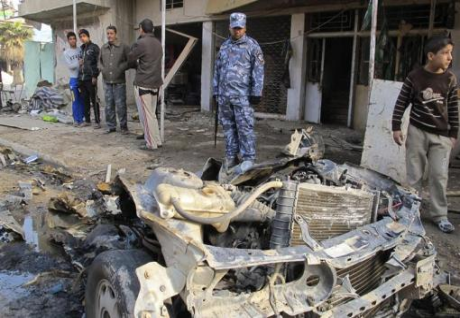
Iraqi security forces inspect the site of a bomb attack on December(Reuters)
Iraq Body Count (IBC), a British NGO, warned on Monday that, contrary to apparent trends in figures released by the Iraqi government, the level of violence has changed little from mid-2009, though attacks are markedly down from when the country was in the throes of sectarian war in 2006 and 2007.
In all, the non-governmental organisation said an estimated 162,000 people were killed in Iraq in the nearly nine years of conflict.
It said around 79 per cent of the fatalities were civilians, while the remainder included US soldiers, Iraqi security forces, and insurgents. "The violence peaked in late 2006 but was sustained at high levels until the second half of 2008 -- nearly 90 per cent of the deaths occurred by 2009," IBC said in a statement.
But it warned that "there has now been no noticeable downward trend (in civilian deaths) since mid-2009." "Recent trends indicate a persistent low-level conflict in Iraq that will continue to kill civilians at a similar rate for years to come. While these data indicate no improvement, time will tell whether the withdrawal of US forces will have an effect on casualty levels."
US troops, who at their peak numbered nearly 170,000 on as many as 505 bases in Iraq, completed their withdrawal from the country on December 18 and Prime Minister Nuri al-Maliki dubbed Saturday to be "Iraq Day", marking when the bilateral pact allowing American forces to stay expired.
IBC said it had recorded more than 114,000 civilian deaths in Iraq since the invasion, and said the addition of figures from US military logs published by whistleblower website WikiLeaks, as well as officially recorded US and Iraqi security deaths and insurgent tolls, put the overall figure at 162,000.
The worst non-civilian group affected were the Iraqi police, with 9,019 reported deaths, and Baghdad was the most dangerous city in the country, with half of the recorded deaths, equating to 2.5 times the national average.
A total of 4,474 US soldiers died in Iraq, as well.
The NGO's overall toll differed markedly from that published by the Iraqi government, which said on Sunday that 2,645 people were killed in violence in 2011, compared to IBC's toll of 4,059. Iraqi government figures, unlike IBC data, indicate attacks decreased significantly last year from 2010, when 3,605 people were killed.
The government's monthly data, which does not go back to 2003, puts the death toll since the beginning of 2007 at 34,485.
The IBC release came a day after Maliki called for Iraq to kick-start the rebuilding of its violence-wracked economy and infrastructure, with the country mired in a political standoff between the Shiite-led government and a key Sunni-backed bloc that has raised sectarian tensions.
"The coming period is no less important or dangerous than the previous stage," Maliki said Sunday during a speech in Baghdad's Al-Rasheed hotel, in the capital's heavily-fortified Green Zone. "Our work has just begun."
Maliki had declared last Saturday to be a national holiday dubbed "Iraq Day", and said the country's days of dictatorship and one-party rule were behind it, even as rival politicians have accused him of centralising decision-making power.
Short link: